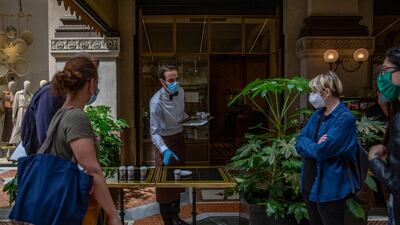The European Union has backed calls to independently evaluate the World Health Organisation’s response to the global coronavirus outbreak.
The 27-country bloc joined more than half of the WHO’s member states in pushing for the probe, as Europe further emerges from a months-long lockdown.
According to the draft resolution supported by 122 countries, the WHO should “initiate, at the earliest appropriate moment, and in consultation with Member States, a stepwise process of impartial, independent and comprehensive evaluation, including using existing mechanisms, as appropriate, to review experience gained and lessons learned from the WHO-coordinated international health response to Covid-19”.
This includes “the effectiveness of the mechanisms at WHO’s disposal” and “the actions of WHO and their timelines pertaining to the Covid-19 pandemic”.
The motion, which will be ratified later this week, also called for the identification of “the zoonotic source of the virus and the route of introduction to the human population, including the possible role of intermediate hosts, including through efforts such as scientific and collaborative field missions”. It did not mention China specifically, where the virus is believed to have originated.
German Chancellor Angela Merkel offered support for the WHO’s efforts to combat the pandemic but said that countries should “work to improve procedures” at it and ensure its funding is sustainable.
Germany has fared far better than other European key players with more than 175,000 cases but only just over 8,000 deaths. While it has begun easing some lockdown measures, small-scale protests against government policy still took place over the weekend in Berlin, Munich and Stuttgart.
On Sunday roughly 70 people tested positive for the coronavirus at a refugee home in western Germany. It’s reported another 500 asylum-seekers who live at the same facility will now need to be tested.
The news angered Green Party politician Horst Becker, who said “we have repeatedly called for blanket testing in these homes”.
"Now we can see that this is happening far too late," he told the Kölner Stadt-Anzeiger.
Parts of Europe have slowly begun to ease the lockdown after a strict quarantine period that has lasted since early March for some.
Restaurants, cafes and shops are being re-opened in Italy, one of the hardest hit countries in the world with more than 32,000 deaths, albeit with social distancing measures. Reports said Italians flocked back to old haunts with a mixture of relief and joy.
Tourist hotspot Spain – another severely hit EU country - is hoping to allow foreign visitors back by late June in an effort to kick-start its economy, although there is a two week quarantine on overseas travellers for now.
Britain meanwhile was set to delay the nationwide launch of a contract-tracing App until June at the earliest. Care homes in the country remained a blackspot for the outbreak with a 38 per cent rise in cases over the latest week of reporting.


